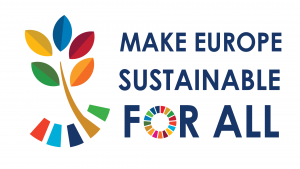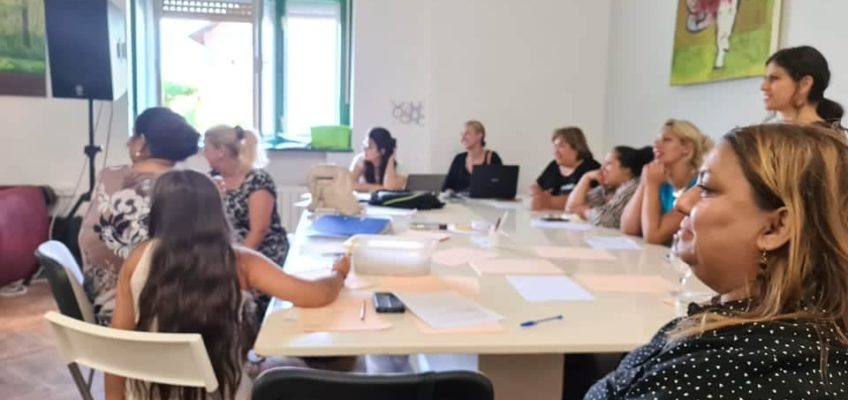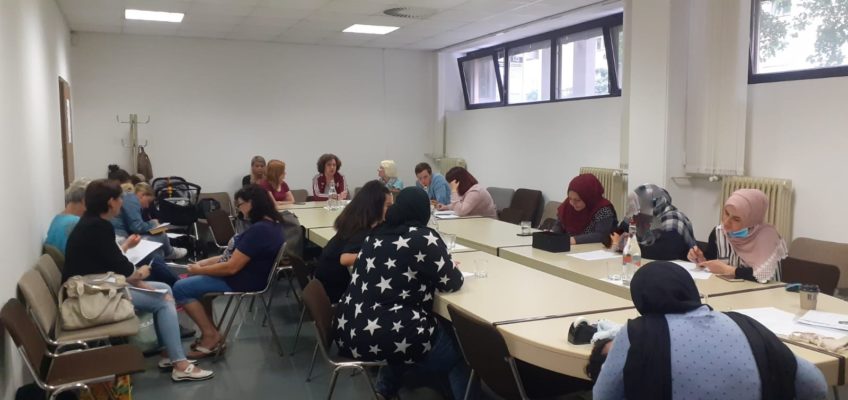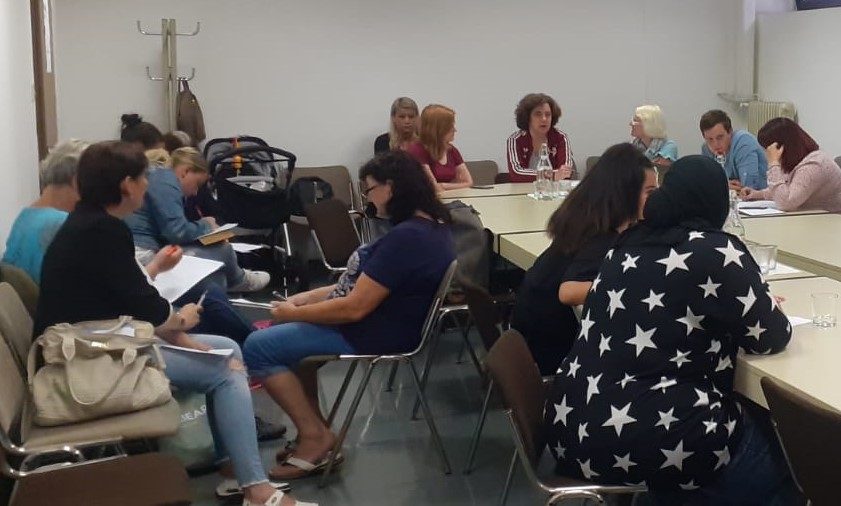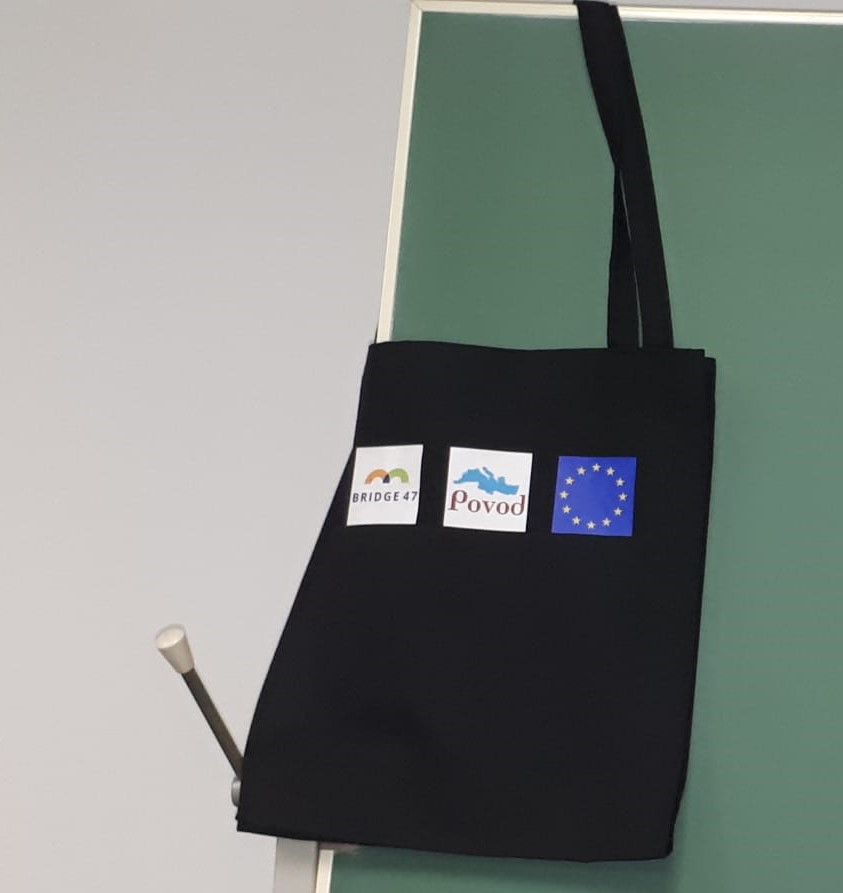Recommendations for asylum policies and integration programs are still in process but almost ready in English, Arabic and Slovenian. Below you can have a look on the drafted English copy. we also invite you to register in our upcoming seminar and-or public panel discussion on 31, August. About the event on 31, August: Invitation to “Integration in Globalization” workshop and panel discussion.
Integration in Globalization is an innovative methodological frame that gathers researchers, NGOs staff and migrant with refugee and asylum-seeking status in a co-working environment to 1. Analyze migration and integration policies 2. Deliver infield feedback and transparent evaluation and 3. Activate the role of research design in bridging the gap between written policies and its implementation.
The final event of our framework is open for new participants and stakeholders to two activities taking place between 10.00 and 13.00 on August 31st 2020 in Kotnikova ulica 28, Ljubljana, big conference room.
10.00 to 11.30: Conclusive workshop on evaluation and reflection of key findings of migration and integration policy analysis. The workshop is divided into sub-themes
a) Gender mainstreaming of migration and integration policies
b) research design in relation to recommendations of existing gap between written policies and its implementation.
12.00 to 13.00: Panel discussion open to public of findings and outcomes from the implementation of the integration in Globalization framework.
13.00: Intercultural networking reception.
The working language is English with available cultural mediation between Arabic and English language.
You are invited to join us by sending the following information to samar.mediator@gmail.com
• Name and surname
• The sub-theme you are interested
• Dietary requirements, if any
Co-funded by the EU
———————————————————–
Introduction:
Integration in globalization is a small-scale framework that aimed to:
1. Activate the role of end users of migration and integration programs in the evaluation of these programs,
2. Enhance cultural ethnography and intercultural sensitivity in research design on integration and migration policies and
3. Create alternative educational and communication tools for intercultural trainers.
The following recommendations are coming from people who are holding refugee status, migrants and civil society representatives in Slovenia:
Recommendation on asylum seeking policies:
• Redefining the concept of asylum by easing the requested proofs for asylum to include person testimony and widen the proofs for asylum from similar events that took place in the fled country.
• Follow up with cases where asylum was declined and people were deported. To learn from cases where people were endangered and-or threatened after their deportation.
• Include poverty as a risk factor that is life threatening and therefore eligible to be considered as a reason for asylum
• Gendering the asylum process in connection to gender roles and its based violence in the fled country.
• Minimizing or abolishing the detention period for people who were rejected asylum
• Shortening the period that asylum seekers need to wait until they get a work permit before they are guaranteed international protection or refugee status.
• Making more flexible rules regarding family reunifications to be tailormade to the individuality of each case. Redefining the concept of family from an intercultural point of view and the concept of adulthood and childhood to be sensible to different realities.
Recommendations for integration programs:
• Encouragement of social incentives from social recognitions of talents, skills and contributions of refugees and migrants
• Self-assessment tools for knowledge and skills recognitions instead of formal recognition of certificates. For example, the youth-pass for self-learning assessment implemented in Erasmus plus youth programs.
• Creating social events for housing where refugees can get to know house owners and expand their networks to search for houses.
• Expanding the ethnic social networks of migrants when designing the integration program. Not to accept only refugees but also to accept migrants regardless of their legal status in the integration program.
• Provide sense of ownership to refugees in their housing process by providing translation and yet make people search for their houses by their own.
• Provide access for special buildings for people who cannot find a house from the refugee community. For example, people who are subjected to discrimination that affects their chances to find housing in Slovenia because of their legal status.
• Interreligious educational programs to combat Muslim Phobia specially against women who choose to wear headscarf.
• Interreligious educational programs to combat xenophobia not only toward migrants, but also fear of integration with the hosting society that can also exist in the migrant community.
• Avoid ethnic segregation in occupations, as this can lead to institutionalised racism.
• Redesigning the curriculum in secondary schools to be tailormade according to the different needs of different students. More engaging hours and tailor designed courses for students from migrant backgrounds to catch up faster with native ones. This is in order to avoid dropout of migrant students and children.
• In implementation of social services not to consider automatically that men are the head of the families unless it is agreed on by all the family members.
• Achieving gender equal representation in certain occupations connected to translation, social work and cultural mediation.
• Assuring ethnic and gender equality in public employment in positions responsible for the evaluation and the implementation of asylum and integration programs and policy design.
• Creating integration programs that combine people with less opportunities like people not in Education, Employment, or Training for long with people who are migrants including but not only refugees and asylum seekers.
• Creating integration programs that combine people who are subjected to various prejudices and hate speech narratives like unemployed people subjected to social stigma, people who are subjected to homophobia and people who are subjected to Muslim-phobia or xenophobia
